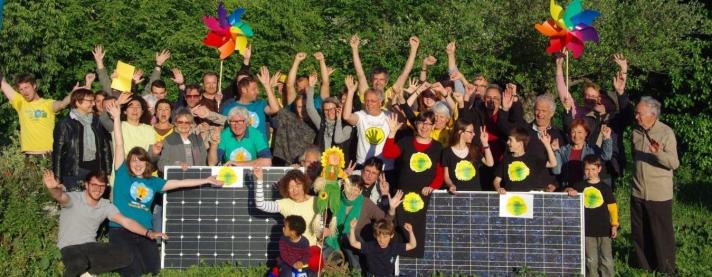
The Energy Communities Repository (ECR) organised a workshop on 22 February 2023, on behalf of the European Commission, to explore and discuss different barriers and drivers for the uptake of energy communities (ECs) identified by ECR, for the purpose of drafting a report on barriers and action drivers.
The workshop successfully brought together 58 participants, including ECs, regulators, system operators, market actors, and academics, to share insights and understand each other's perspectives. The workshop also tested some preliminary findings of the forthcoming report on barriers and action drivers to facilitate the development of ECs in the energy markets and transition against different stakeholder groups. The workshop was held under Chatham House rules.
Background
European Union Member States need to transpose the provisions on renewable energy communities and citizen energy communities of the Clean Energy Package. One of the ECR's tasks is to track and compile national legislation, policies and measures across the EU on energy communities. By reviewing different national frameworks and obtaining insights from national experts and ECs, the ECR has identified some barriers and action drivers for developing renewable energy production, sharing and supply by ECs. At the beginning of the workshop, the ECR presented elements of the draft report on the obstacles and action drivers to developing ECs, focusing specifically on energy sharing and supply. Then, a roundtable and breakout sessions on energy supply, energy sharing and energy production gave room for an open discussion with all participants. A selection of insights taken from the report presentation and the discussion is reported below.
Energy sharing
The draft report identifies several barriers that can impede energy sharing through an energy community, including a lack of regulatory frameworks in many countries, making it difficult for individuals and organisations to share excess energy with their neighbours, friends, family and community members. The report outlines a lack of clearly defined concepts of energy sharing. Moreover, insufficiently clear duties and roles for system operators and administrative procedures, combined with interdependencies with suppliers and limited remuneration schemes for excess production, hamper the uptake of energy sharing in some Member States.
On the other hand, several enablers for energy sharing emerged. Some Member States that have more experience with energy sharing defined the activity of energy sharing and how to organise an EC, clarified procedural requirements that distribution system operators (DSOs) can follow in facilitating energy sharing, and established transparent and forward-looking grid planning that takes ECs into account. Some countries also provided investment support and pathways for remuneration of excess production and created mechanisms to make ECs more accessible to all consumers.
During the discussion, there was an agreement that there are still many barriers to energy sharing. One of the significant issues was related to data access and sharing. Another issue was the lack of software development and IT infrastructure for energy sharing using the public grid. Participants also cited a lack of incentives for energy sharing. Investment support, in the form of grants or loans, can help communities overcome the challenge of raising capital. Support in the form of reduced grid tariffs, rather than direct support or tax reductions, is considered by some participants as problematic as switching the burden to grid users who cannot afford to join energy sharing operations. One participant argued that collective self-consumption could be a credible alternative to energy sharing, peer-to-peer trading, and ECs. Participants also expressed that members of ECs should still be able to choose their suppliers for residual demand.
Furthermore, some participants raised the problem that in some Member States, vulnerable households would lose their benefits if they participated in energy sharing initiatives or ECs, because asset ownership would exclude them from receiving public support. The solutions proposed were improving the links between social and energy policies so that they can complement each other. There is also a need to provide public incentives and support schemes for ECs that contribute to alleviating social issues such as energy poverty and to spread best existing practices.
Energy supply
The ECR shared some of the preliminary findings of the report on barriers and action drivers at the beginning of the workshop. The barriers for ECs to supply energy include the lack of acknowledgement of ECs in regulatory frameworks, administrative obstacles in obtaining the supplying license and complying with regulations challenges related to their business models and hedging strategies, barriers for community suppliers in accessing finance and entering into direct contracts to sell renewable energy, for example through power purchase agreements (PPAs). More recently, technical and administrative challenges related to government interventions during the energy crisis complexified the activity of ECs in supplying energy. In addition, community suppliers in some Member States lack consumer trust regarding their affordability and reliability. Critical enablers to overcome these barriers include tailoring regulatory frameworks to energy community suppliers, providing access to financing and technical assistance, facilitating market access through services provided by market actors, and promoting awareness and education.
During the discussion and thematic breakout session on community energy supply, various barriers and action drivers were confirmed or identified. Obstacles identified included technological issues, supply license requirements, volatility of energy markets, the complexity of imbalance settlement, lack of framework for aggregation, and lack of dedicated support for community suppliers.
Action drivers included expansion of collateral requirements, shared supply license, clarification of the role of a market facilitator versus market operator, facilitation of PPAs, and development of local energy sharing and trading platforms. However, supplying energy implies taking up more responsibilities by obtaining a supply license. Balancing support with complexity, financial resilience, and consumer protection is essential. There are requirements for balancing service providers and responsible parties, including ECs. ECs should aim to have a quality of customer service comparable to traditional suppliers. The amount and complexity of data handled and created for the supply activity increase significantly compared to the more traditional activities. This may become even more complicated in the next years with a new NIS 2 directive published in December 2022 on cyber security, which may hold energy market operators accountable for more responsibilities.
Activities beyond energy sharing and supply
Beyond discussing the specific activities, many elements discussed during the workshop transcended the scope of the activities of supply and sharing. ECs existed before but have recently been given a new meaning with the Renewable Energy Directive and the Internal Market for Electricity Directive in the EU. Definitions of ECs have been raised as an issue by several participants. For instance, some participants questioned whether initiatives from private companies or local authorities without direct citizen participation could label themselves as ECs. The discussion showed that different conceptions of control and ownership have emerged. For instance, some communities do not necessarily own the assets but have control over the decisions of the assets, while other Member States require ownership. The value-driven aspect of ECs has also been mentioned as a core aspect of ECs, motivating their support.
Participants highlighted the need to differentiate further between barriers specific to ECs and barriers to all or only small market actors, such as permitting. Government interventions to reduce prices during the crisis have also sometimes undermined the investment and business case for collective production. For example, due to their often small size and community approach to supply themselves from community-owned production, community suppliers have experienced more significant challenges navigating government interventions, such as price caps and hedging obligations, compared to larger suppliers with stronger market positions and economies of scale.
DSOs, which are often monopolistic and heavily regulated, with different rules applying to different countries and within the same country, are crucial in facilitating the transition in a fair and non-discriminatory way. They play a key role in enabling ECs by facilitating their access to the grid and, generally, to the data needed for sharing and supply. On the other hand, ECs can be crucial in facilitating the transition to clean energy and managing demand-side flexibility at the distribution level when enabled through appropriate incentives.
While there is still little but growing appetite for the creation of ECs, public information and awareness raising around the benefits of participation in an energy community could turn out instrumental. People who want to act in community energy initiatives without clear economic benefits are a minority. Information on ECs, and their offers and services, should be more accessible through public sources. To gain and maintain widespread trust, ECs should strive to provide high-quality information, including on adequate pre-contractual conditions, pricing, contract termination and leaving the community, as well as dealing with complaints and changes to tariffs. In this way, while acknowledging that ECs are not traditional market actors, they still need to guarantee a professionalised approach towards their members. Members should be made aware that they have both standard supplier-consumer and member-investor relationships. One consideration was raised that the overly protective regime for consumers that maintained low retail prices during the energy crisis, shielding them from raising wholesale prices, could represent a barrier for consumers willing to be more active in the energy sector.
One participant recommended establishing goals and targets for community energy initiatives. Clear and stable rules and targets at different levels of government to encourage communities to take action would be beneficial.
During the workshop, one of the breakout sessions focused on energy production, an activity in which communities have engaged for a long time in many countries. Barriers to this activity include unclear and lengthy procedures, lack of financing and financial entities willing to take on risks, and insufficient knowledge and exchange of information. Moreover, the sector suffers from not benefiting from standard rules for grid access and a lack of clarity on timelines, procedures or costs. Suggested solutions include specialised financial institutions, government loan guarantees, public funding and technical assistance, major access to information and tools, capacity building and training programs.
Participants suggested through a poll new priority areas for the report, such as flexibility, energy efficiency, and building renovation. The Energy Communities Repository will now continue drafting the report, engage further with stakeholders, and publish a database of policies implemented in the different EU Member States.
Details
- Publication date
- 5 June 2023
- Author
- Directorate-General for Energy


